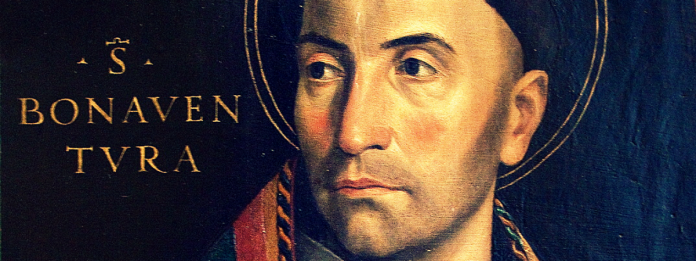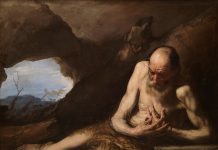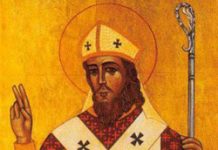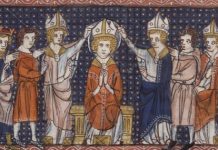(This year, I have the great grace of being in Assisi on the feast of this great Franciscan saint – more to say on that. For now, some words on Bonaventure, the ‘second founder’ of the Franciscan Order, which continues to do great things for God).
Some of the ‘Doctors of the Church’ have epithets, and Saint Bonaventure, whom we celebrate today, is the ‘seraphic’, perhaps for his transcendent teaching; also due to his charism, putting into systematic words the sublime and radical wisdom of the ‘poverello’, Saint Francis, the ‘seraph’ wounded with the fire of the stigmata on Mount Alverno.
Bonaventure, Franciscan, bishop, cardinal, doctor, and friend of Saint Thomas, died on this day in 1274 while attending the Second Council of Lyons – a few months after Thomas Aquinas, who had gone to his own eternal reward the previous March 7th on his way to the council. Both have been proclaimed Doctors of the Church – an elite company, with but 37 members – and both wrote ‘Summas’, or compendia, of theology, even if, for various reasons, it was Thomas’ – the Common Doctor – that the Church officially adopted in her teaching. But Bonaventure has much to teach us also in his doctrine on God, His providence, the salvific purpose of all history and creation.
Born in 1221 Giovanni di Fidanza, almost nothing is known of his childhood (except the name of his parents). His birthplace at Bagnoregio, an hour’s drive northwest of Rome, is still commemorated with a simple plaque, evincing his humble beginnings, which he never really left behind. Young Giovanni was apparently miraculously cured by the prayers of Saint Francis (who died in 1226, so was still alive in the lad’s first years). The story is told that Francis held the boy is his arms, and said that good things were to come from his life – hence bona ventura, and the name stuck.
With an already instilled devotion, Giovanni joined the newly-founded Franciscans, his piety and genius recognized early – he helped reform them, galvanizing what might have been a rag-tag group of wandering mendicants (not that there’s anything wrong with that) into a spiritual and intellectually rigorous band of brothers – even though they would have their travails, as the more ‘spiritual’ elements always strove to go back to their original roots of radical poverty, which was not practically sustainable. But then there was the opposite tendency to hoard up riches and property, and finding a balance has been a constant struggle ever since. The Franciscans would be the largest Order in the Church if it were not for the fact they are so fissiparous.
But Bonaventure, besides his role in helping found and define the Order – not least by composing much of the original Rule – through his own studies and works, became one of the greatest intellects of his age, filled with ‘great lights’ such as Thomas (a member of the also-newly-founded Dominicans, who had a more stable beginning and rule). Bonaventure was eventually elected Superior, then made a Cardinal, but always retained his humble ways – when someone came to the convent to find the great man, they had trouble picking him out him amongst his brethren, washing dishes.
Bonaventure also wrote the first definitive biography of Saint Francis, a beautiful contemporary picture of one of the greatest of saints. Bonaventure lived the joyful Franciscan charism well, in humility and charity, right up to the end, when he was appointed a Cardinal and deputed to attend the Second Council of Lyons in 1274. His friend, the Dominican Thomas Aquinas, died in Italy on the way to the Council, and Bonaventure followed him soon afterwards, dying while attending the Council. I’m sure the saints and doctors would much prefer to meet in heaven, as fruitful as their presence at Lyons may have been. As the saying goes, the saints are more powerful in death than in life.
There is much more to say, and for those who would like Pope Benedict’s three addresses on Bonaventure, on whom he completed his doctorate, may find the first of them here.
I will leave you for now with two quotations: First, a brief comment from a papal notary who knew Bonaventure, which sums up our saint well:
A good, affable, devout and compassionate man, full of virtue, beloved of God and human beings alike…. God in fact had bestowed upon him such grace that all who saw him were pervaded by a love that their hearts could not conceal.
And the words of Bonaventure himself, from today’s Office:
For this passover to be perfect, we must suspend all the operations of the mind and we must transform the peak of our affections, directing them to God alone. This is a sacred mystical experience. It cannot be comprehended by anyone unless he surrenders himself to it; nor can he surrender himself to it unless he longs for it; nor can he long for it unless the Holy Spirit, whom Christ sent into the world, should come and inflame his innermost soul. Hence the Apostle says that this mystical wisdom is revealed by the Holy Spirit.
The fire of the love of God, which burns away all our sin, our deceit, our faults, and leaves us purely His, in ineffable bliss.
Saint Bonaventure, Seraphic Doctor, ora pro nobis!











